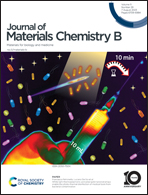Development of nanozyme based sensors as diagnostic tools in clinic applications: a review
Abstract
Since 1970, many artificial enzymes that imitate the activity and structure of natural enzymes have been discovered. Nanozymes are a group of nanomaterials with enzyme-mimetic properties capable of catalyzing natural enzyme processes. Nanozymes have attracted great interest in biomedicine due to their excellent stability, rapid reactivity, and affordable cost. The enzyme-mimetic activities of nanozymes may be modulated by numerous parameters, including the oxidative state of metal ions, pH, hydrogen peroxide (H2O2) level, and glutathione (GSH) concentration, indicating the tremendous potential for biological applications. This article delivers a comprehensive overview of the advances in the knowledge of nanozymes and the creation of unique and multifunctional nanozymes, and their biological applications. In addition, a future perspective of employing the as-designed nanozymes in biomedical and diagnostic applications is provided, and we also discuss the barriers and constraints for their further therapeutic use.

- This article is part of the themed collections: Nanozymes and Journal of Materials Chemistry B Recent Review Articles


 Please wait while we load your content...
Please wait while we load your content...